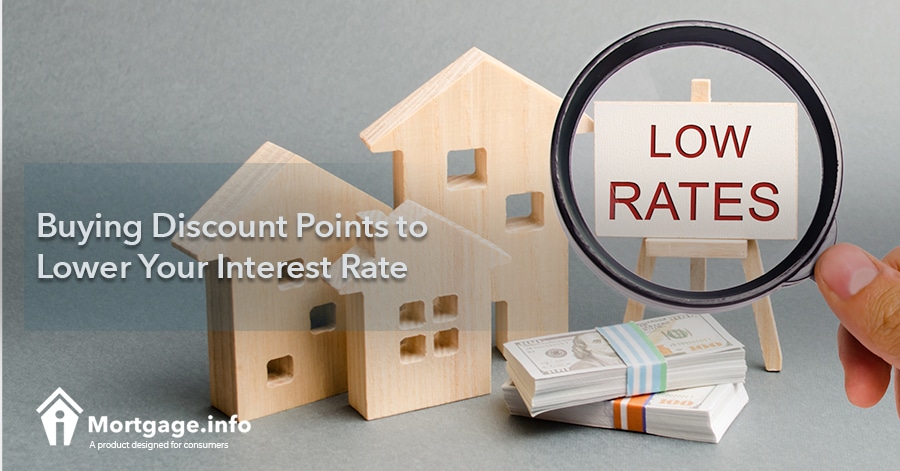
It is an age-old question: should you pay points in order to secure a lower interest rate? While every situation differs, there are certain factors to consider before you determine the right answer for you. How much money you have to put down on the home as well as pay for closing costs is one of the largest factors. Other factors to consider, however, include how long you plan to stay in the home; how much disposable income you have each month after the new mortgage payment; and the amount you will save with a discount point.
What is a Discount Point?
First, let’s start with defining a discount point. This cost is something you pay at the closing directly to the lender. In exchange for the “point,” which each point equals one percent of your loan amount, you receive a slightly lower interest rate. Every lender can determine the amount they will lower the interest rate for each point. The standard amount equals 1 point for every 0.25% drop in the interest rate, but every lender can charge the amount they determine is appropriate.
How Long Will You Stay in the Home?
The first consideration to make is how long you will stay in the home. Of course, no one can predict the future, but you should try to have somewhat of a plan together. Is this your “forever” home or do you see yourself moving in a few years? If you transfer jobs or job locations often, this will probably not be the home you stay in for the long run. This helps you to determine if you should or should not pay to lower your interest rate. Generally, the less time you plan to stay in the home, the less important it becomes to pay the discount point.
The Break-Even Point When You Pay Points
The best way to determine if you will stay in the home long enough to pay the upfront discount fee is to determine your break-even point. In order to figure this out, you need to know the following:
- Amount of the discount point(s)
- Interest savings you would gain each month after paying the point
You then divide the amount you pay for the point(s) by the monthly savings. This will give you the number of months it will take to make up for the upfront cost for the fee. If you will not stay in the home for at least the number of months you just calculated, it does not make sense to pay down the interest rate.
Here is a real life example:
- You pay 2 points on a $200,000 loan. This means you pay $4,000.
- You will save $50.55 in interest on a monthly basis by paying the points.
$4,000/$50.55 = 79 months
This means you should stay in the house for 6 ½ years in order to see the benefit of paying $4,000 up front for a lower interest rate.
The Amount of Your Disposable Income
Your disposable income is the money you have left over each month after you pay the necessary bills. These bills include your mortgage (principal, interest, taxes, and insurance), car payments, student loans, and credit card bills. If your disposable income is not high enough for you to be comfortable each month, paying to lower the interest rate might be a good idea. This way you can increase the amount of money you have left over each month, which you can then save for emergencies. Because owning a home comes with a large amount of responsibilities and surprises, such as leaking pipes, broken appliances, or HVAC issues, you need to have a way to pay for emergencies such as this. In addition, saving money every month helps you in the event that you lose your job and need money to continue making important bills, such as your mortgage payment.
Is the Savings Worth the Cost?
The final consideration is to determine if the savings is worth the cost, which involves many factors. Even if you have the money to pay points, it is not always the smart choice. First, you should determine if you would save enough to make it worth it. We covered this briefly when we talked about the break-even point. But, sometimes even if you plan to stay in the home long enough to hit the break-even point, it does not make sense to pay the costs. Factors to consider include:
- How much do you have in reserves? If you do not have a lot of money saved up for those emergencies, it does not make sense to pay all of your money up front and take a chance in the future.
- What type of loan is it? If you will have an adjustable rate mortgage, it does not make sense to buy the rate down since the rate will adjust in the future. If, on the other hand, you will have a fixed rate mortgage, you reap the benefits of buying the rate down for the life of the loan or until you sell the home.
- Can you afford it? The last factor to consider is if you can afford to buy the rate down. Even if you have the money, consider if you would be better off putting the money towards the down payment or towards your other closing costs. If you will just be scraping by because you wanted to lower the interest rate, it might not make sense to do so.
Discussing with not only one lender, but several, the option to lower your interest rate is the best choice. This way you can see what different lenders have to offer and how you can benefit. Just because you hear that you can receive a lower interest rate does not mean you should. Considering all of the factors will help you determine the right choice for you.
